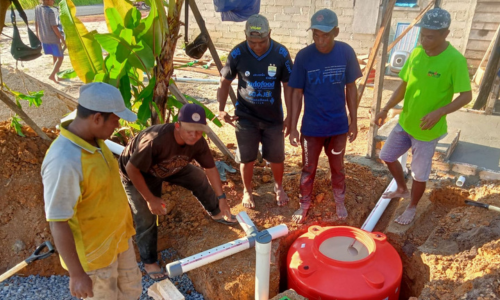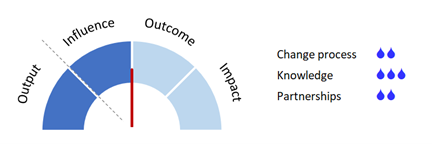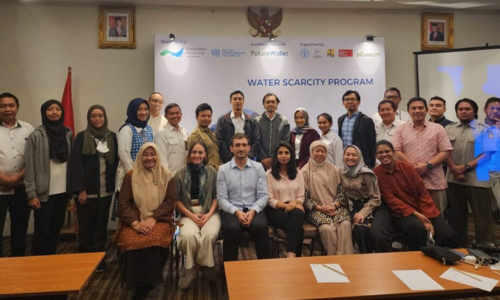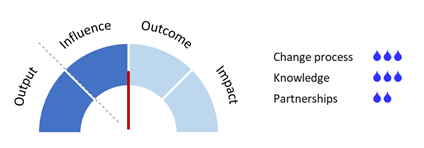Regional impact
Improving access with Safe Water Gardens

Despite a huge government effort to improve provision, around 18 million people in Indonesia still lack safe water and 20 million lack access to improved sanitation. For many households, water sources are distant, contaminated, or expensive, and household sanitation is unaffordable.
With a view to changing this, GWP Southeast Asia collaborated with Water Stewardship Indonesia through the Safe Water Gardens programme. Three villages in Bintan Regency committed to achieving access to proper and safe sanitation. This “Bintan project” is the first such model village project and has received political support from the governor of Riau Island Province. Currently, 58 households in Busung, Kuala Sempang, and Pengujan are operating as model villages. The project includes the installation of 48 Safe Water Garden units – incorporating a wastewater management and water recycling system, five water reservoirs, 51 kitchen sinks, 46 toilets, and 58 Nazava water filters. Since the launch of the Bintan project in 2022, 216 residents of the 58 households have been positively affected and 13 new micro-businesses have been established.
The project is grounded in data collected through an e-survey platform created by GWP Southeast Asia, who also trained residents on how to complete the survey and on the importance of access to safe sanitation. Survey data open a window on the real baseline conditions of water and sanitation at the household level, and have been used to select locations for the first Safe Water Gardens.
With the data-driven success in Bintan, the Safe Water Gardens programme is now expanding across the country, including in Java in collaboration with a multinational private company.

Accounting for water scarcity in Indonesia

The different regions of Indonesia have vastly different experiences with water availability: some have too little, while others have too much, face extreme variability, or deal with poor water quality. Together these problems affect the majority of the country’s 275 million people.
The Water Scarcity Program, developed by the United Nations Food and Agriculture Organization (FAO), aims to provide technical and policy support to help countries like Indonesia ensure that water use is managed sustainably and productively through progressively more accurate water accounting and transparent water allocation policies and processes.
The programme has been implemented across several countries in Southeast Asia, thanks in part to GWP Southeast Asia. In Indonesia, FAO collaborated with GWP Southeast Asia to facilitate a scoping study and training on water accounting for the agricultural sector in 2021 and 2022. In 2023, GWP’s regional secretariat continued to join FAO in implementing the programme, which is supported by the Australian Government through Australian Water Partnership.
Two training sessions this year, Water Accounting and Allocation Training I and II, allowed 68 total participants to build a solid technical understanding of water accounting concepts in Indonesia. This included the development of a water account using a variety of geospatial and water resources modelling tools. A National Multidisiplinary Team Meeting also provided an opportunity to discuss the initial draft outline of a National Water Scarcity Management Action Plan and Water Accounting Roadmap II Workshop.

Launching a regional conference on IWRM
Implementing integrated water resources management (IWRM) is vital in achieving water security and other Sustainable Development Goal (SDG) targets. However, this is not an easy task. GWP Southeast Asia have identified a set of challenges related to IWRM that became the focus of Southeast Asia’s first regional conference on IWRM.
The process began in 2020 with an analysis of SDG 6.5.1 IWRM Monitoring results and a series of multi-stakeholder consultations led by the Country Water Partnerships (CWPs) from Cambodia, Indonesia, Lao PDR, Malaysia, the Philippines, and Vietnam. The challenges identified were categorised into three main themes: efficient water allocation, acceleration of safe water and sanitation access, and urban flood risk reduction. In 2022, the CWPs put forward challenges that should be systematically discussed at the regional level and followed up with clear solutions.
This process led to the first IWRM Regional Conference in October 2023, organised by GWP Southeast Asia and partners. The event was held back-to-back with the second Stakeholder Consultation Meeting of the World Water Forum 2024.
Participants from around the region mapped the common regional challenges and shared innovative solutions in water security, ranging from water and sanitation to environmental protection and water for economic development. GWP Southeast Asia are now helping some of the presenting partners develop joint proposals to implement their innovations in Southeast Asia. The second day of the conference was devoted to transboundary water cooperation. Based on this discussion, GWP Southeast Asia are also working with the Association of Southeast Asian Nations and the Mekong River Commission to organise a Regional Transboundary Water Cooperation Dialogue in 2024.

